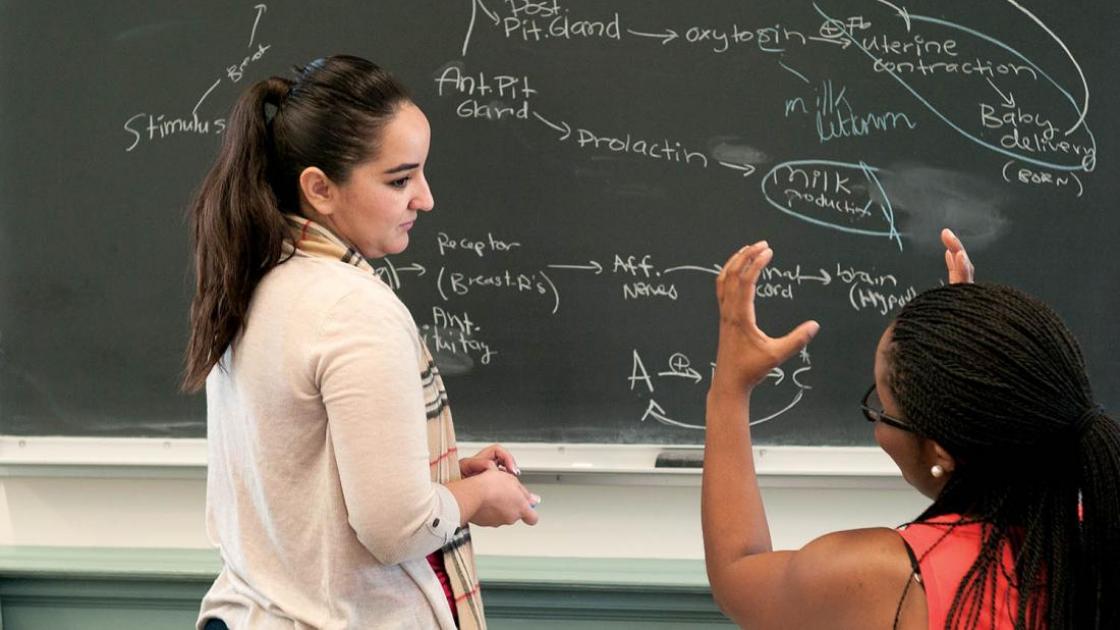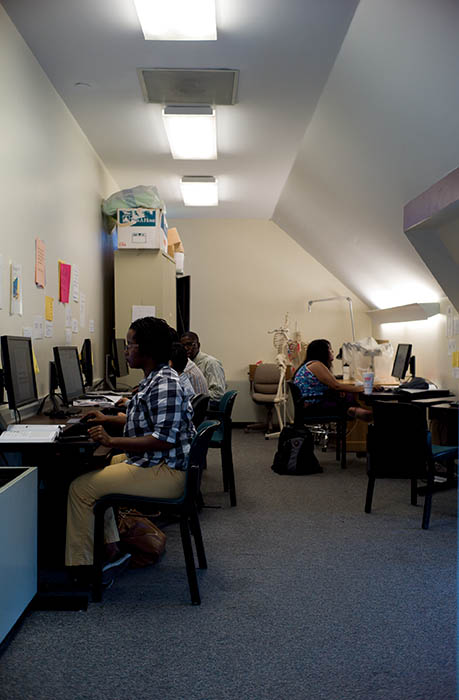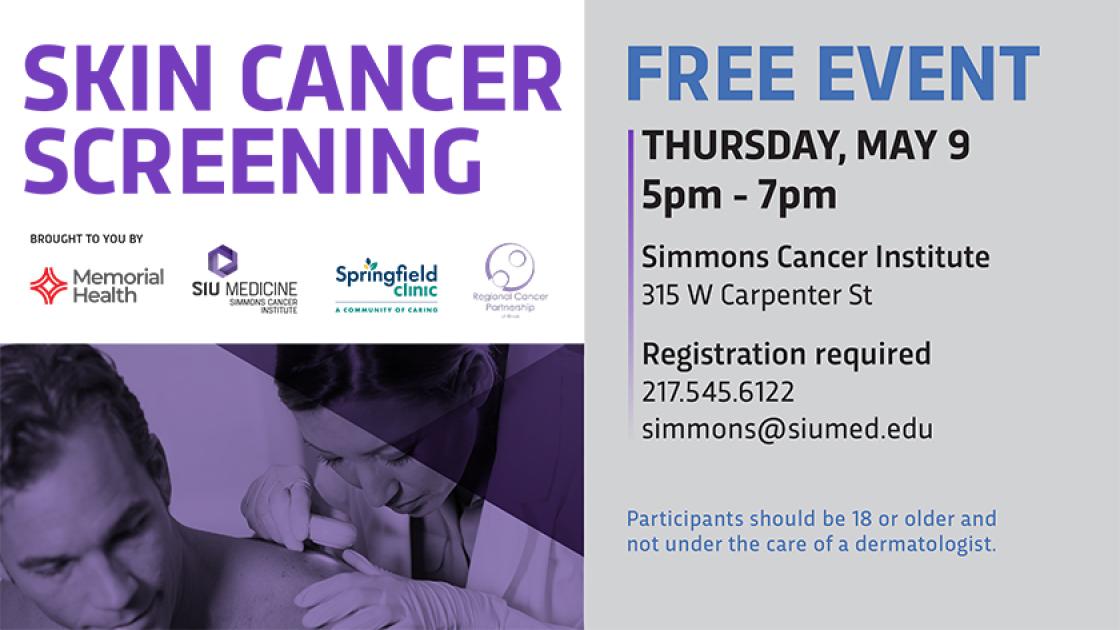
MEDPREP: Doors to Opportunity
Written by Rebecca Budde | Photographs by Jim Hawker
Published in Aspects Magazine Autumn 2012; 35-4
The first floor classroom of Wheeler Hall in Carbondale is alive with learning as biology instructor Shirley McGlinn meanders around the room, questioning and guiding her students. The students are engaged in a peer teaching project on endocrine regulation mechanisms. They team up, writing terms on the chalkboard, labeling them and drawing arrows as they explain the connections. The class is small, as are most of the classes in Wheeler, allowing the students the freedom to engage in
collaborative learning.
These college graduates have one goal in mind: to become medical professionals. For 40 years, SIU School of Medicine’s Medical/Dental Education Preparatory Program (MEDPREP) has opened doors for these students to enhance their potential for
success in health professions schools.
“The way the MEDPREP instructors teach is contagious,” says Jaleen Sims, a MEDPREP alumnus and second-year medical student at SIU School of Medicine. “I often find myself using the same techniques to learn or teach classmates concepts in medical school. One of the greatest benefits for me was that I was able to take upper level classes to prepare for the first year of medical school. I was well ahead in my gross anatomy class during my first year of medical school, which allowed me to help others in the class and focus on other topics that were less familiar to me.”
Founded at SIU School of Medicine in 1972, MEDPREP is one of the oldest programs of its kind. “People from the West Coast to the East Coast, the North and the South, know about MEDPREP,” says Harold Bardo, Ph.D., director of MEDPREP. Similar programs have sprung up around the nation, but MEDPREP’s numbers speak for its high reputation. Approximately 200 students apply for one of the 36 spots in each first-year class.
In keeping with the School’s mission, the program’s goal is to increase the number of underrepresented minority and disadvantaged students from southern and central Illinois who will enter and graduate from health professions schools, including medical, dental or veterinary school. “We are especially looking for students who want to serve in medically underserved areas,” says Dr. Bardo.
A Holistic Approach
The faculty encourages group work, collaboration and active participation. Students receive assistance in developing an academic plan tailored to their specific needs. “A holistic approach is the focus of MEDPREP’s two-year experience: academics, personal growth and professionalism,” says McGlinn.
First-year students take classes that focus on learning skills. They develop their study habits and time-management strategies to prepare for the extraordinary amount of information they will be exposed to in medical school. Students may also take other courses in the first year such as physiology, genetics, microbiology or molecular biology.
In addition to studying science, students also refine their verbal reasoning, reading, writing and vocabulary with instructor Gina Paul, Ph.D. “Verbal reasoning was a difficult area for me,” says fourth-year medical student Jeffrey Hubbard. “Dr. Paul was really helpful, spending extra time with tactics to help me understand.” Hubbard plans be an anesthesiologist after receiving his medical degree from SIU School of Medicine. 
“I’ve got another interview,” Victoria Thomas tells Dr. Bardo as she meets him on the second floor stairwell in Wheeler Hall. Thomas is a second-year MEDPREP student and former nurse. Securing a medical school interview wasn’t a possibility for most MEDPREP students due to previous Medical College Admissions Test (MCAT) scores or holes in their academic records.
After many review sessions, lessons on standardized test-taking and late nights of studying, students take the MCAT in the spring of their first year. With improved MCAT scores, second-year MEDPREP students complete the medical school application process and await interviews. “Now that they’ve demonstrated significant gains on the test, they’re getting four, five, six, seven, sometimes eight interviews. That’s a remarkable thing,” Dr. Bardo says.
Their enhanced skills in note-taking, concept mapping and learning allow them to strengthen their academic portfolio by taking upper-level science course such as anatomy, biochemistry, histology and pharmacology. “These students have enormous potential to be physicians,” says biology instructor Anneke Metz, Ph.D. “Their life experiences have made them compassionate. They are good listeners and good communicators.”
Micro-University
MEDPREP is a micro-university, wholly located in Wheeler Hall in Carbondale. The stately building, which shares space with SIU School of Medicine administration, is homey and welcoming on the inside.
On the third floor, study guides and text books line the tables and shelves. Across the room, a board shows a list of the medical schools to which students have been accepted. Another board displays photos and information about all the current students to encourage them to get to know one another. “We look out for one another,” says MEDPREP student Crystal Brand. “The camaraderie here is infectious.”
Some of the most important lessons MEDPREP students learn go beyond their academic curriculum. Students stand and respectfully greet guests and faculty, referring to them as “Mr.” “Mrs.” or “Dr.” They introduce themselves and state their hometowns, which range from cities in Texas to Connecticut. They smile, make eye contact and pay attention to the speaker. They are groomed to act professionally in all their encounters.
They learn how to apply to medical schools, interview and write personal statements. Recently retired career development instructor, Paul Henry, Ph.D., was an instrumental force in guiding the students into personal reflection and professional career development. “MEDPREP provided me with great insight into myself,” says Safiya McNeese, a fourth-year medical student at SIU whose goal is to be an obstetrician/gynecologist. “I remember my class with Dr. Henry where I wrote about why I wanted to be physician; I thank him for that class.”
Support Systems
Dr. Bardo attributes the success of the program and its students to devoted individuals who welcome each student into the MEDPREP family. They are educators, tutors and counselors. The students consider them like family. “The faculty and staff care about young people,” he says. “Their doors are always open so that students are not afraid to ask for help.”
All MEDPREP students have keys to Wheeler Hall, and they retreat there at all hours. They have the personal phone numbers of all the faculty members if questions or problems arise after hours. “We called Dean [Linda] Herrold so many times, and she always helped, even if it was a simple math problem,” says Sims. Linda Herrold splits her time between teaching physics in MEDPREP and overseeing the medical students as assistant dean for student affairs.
Former MEDPREP students refer to McGlinn as “the cool aunt” and “Momma McGlinn,” biology instructor Kathleen Jones as the “family cheerleader” and chemistry instructor, Mary Chaklos, Ph.D., as the “mom who cooks for us.”
“The faculty tries its hardest to help out,” says third-year medical student Kevin Simon. “They are advocates to help us get where we want to go. They’ve changed my view of academics and how I perceive individuals who say they are trying to help me.” Simon, who wants to be a pediatrician, believes that the MEDPREP faculty also teaches the students how to cope with outside influences and distractions so that they don’t impede academic performance.
Counselor Don Patton helps guide and advise individuals on personal concerns and professional behavior to make them the best possible candidates for medical school.
But, like good families, Bardo says that the faculty isn’t afraid to be direct about the students’ academic performance. They expect the students to communicate about what they need to succeed. Biology instructor Barbara Szary, Ph.D., has been a part of the MEDPREP family for more than twenty years, and former students recall her willingness to help when students needed advice. “Dr. Szary is a sweet, mothering person, but she’ll tell the students the hard-core truth without sugar-coating it if that’s what they need,” says Sims.
The open-door policy has led to the feeling of a familial relationship among all those who inhabit Wheeler Hall. “Many of the MEDPREP students are first generation college students from all across the country, and are therefore learning the system on their own,” says McGlinn. The faculty believes that the support system MEDPREP provides keeps the students focused on their academics and professional training.
Along with the faculty members, MEDPREP staff members also help boost the students to success. Glenda Sullivan and Tom Shea, the office support staff, keep the ship afloat on a daily basis. Mr. Terry, a recently retired custodian, is another beloved staff member. He often sat down to have tea with them, brought them treats from home or just talked with the students during down time. As the admissions coordinator and alumni relations, Trent Stevens, the newest member of the MEDPREP family, will keep current and former students connected.
A Proven Formula
MEDPREP’s program hasn’t changed much in 40 years, but it hasn’t needed to. “The best thing about MEDPREP is that we can see success in two years or less,” says Dr. Bardo.
MEDPREP students learn to confront the barriers that have hindered their academic and personal success. Nearly two-thirds of MEDPREP students are accepted to medical school fewer than two years after entering the program. Nearly 90 percent of those have graduated or are expected to graduate. “Those odds don’t seem to be replicated in other programs in the country,” says Wesley McNeese, M.D., SIU School of Medicine executive assistant to the dean for diversity. Like his daughter, Safiya, Dr. McNeese is also a former MEDPREP student.
MEDPREP students have attended more than 70 different health professional schools including dental, optometry, podiatry, chiropractic, veterinary and medical schools. MEDPREP’s 1,325-plus alumni attend medical schools and practice medicine throughout the United States.
Attending SIU School of Medicine is a logical option for many of the MEDPREP students. The students speak of an “easy transition” between life in the MEDPREP program at Carbondale and medical school in Springfield. Eight former MEDPREP students are a part of SIU School of Medicine’s first-year class this year.
DeAnn Moore, a fourth-year SIU medical student, remembers helping other students in labs during her early days of medical school. “The upper level science courses we took in MEDPREP helped make the transition to the first year of medical school much easier,” she says. Moore, who wants to be a pediatrician, will be the first physician in her family.
“I’ve learned so many lessons about myself, especially my staying power,” says Crystal Brand, whose plans after MEDPREP include studying neurology. “Defeat and adversity will come, but you don’t let them overstay their welcome. Things in life are going to get tough, but you have to push through them. That’s one thing I didn’t do in undergrad, but MEDPREP has taught me to push through.”
“The best thing about MEDPREP is seeing people who don’t think they have a chance, get that chance and do well!” says Dr. Bardo. “These students are fighters. They have resilience and when they get knocked down, they get right back up.”



